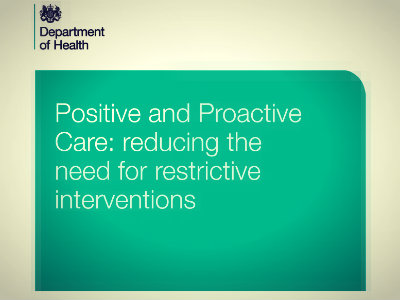
by Phil Howell, BILD accreditation scheme manager
The Department of Health’s two-year Positive and Safe initiative, launched last month, is the latest in a succession of pieces of work to stem from the Winterbourne View concordat. Norman Lamb, the care minister, has described it as the “transformation required across all health and adult social care”. The minister says that the programme has the potential to make “whole scale, system-wide changes” and give us a health and care service “fit for the 21st century”.
Underpinning Positive and Safe is new guidance on positive and proactive care that is being developed by the Royal College of Nursing. For many, this guidance will offer a tool to self-assess or benchmark their practice. It will also act as confirmation that they offer a good level of service, one that respects the individual as an individual, and offers them the therapeutic approach necessary to support their independence and lifestyle choices.
However, this guidance does not significantly shift the goalposts on restrictive interventions. Many people and organisations already see them as methods of last resort. We are well aware that we should minimise their use, that they encompass a range of inherent risk and have little lasting benefit to the individual subjected to them, the person administering them or the on-going relationship between the two. We know this because too often we hear the details of how they have been misused and abused, not as a last resort but to punish, inflict pain and humiliate.
The real change is prevention of the need for restraint
Look more closely and we can see that what has really changed is the focus of the approach to prevent the need for such interventions. Both the guidance and Positive and Safe place significant emphasis on Positive Behaviour Support (PBS). For the first time an approach with a decent evidence base and grounding in learning disability is shown to have relevance and application across the whole of adult health and social care.
Positive Behaviour Support is a values-based approach. It is informed by the principles of applied behaviour analysis and by data at each stage of decision making. At its heart is the aim to embed quality of life as both an intervention and an outcome.
Most importantly, through this guidance, PBS gives us all a common language to identify with and assess our needs for organisational and individual learning. PBS is as much about the cultural shift that is required of so many organisations, as it is about the technical details required in behaviour support planning to achieve the desired outcomes for individuals.
This technical competency will further be supported by the joint specification for learning disability and challenging behaviour services, jointly developed and agreed by NHS England and the Association of Directors of Adult Social Services (Adass).
It is this combination of guidance alongside a programme of implementation that is most welcome. At BILD’s International PBS Research and Practice Conference in Glasgow earlier this month there was a feeling that this might be a seminal moment, and that after years spent raising the profile of PBS, this is an opportunity to get this right.
There is good reason to be cautious. Transformation usually takes place when everyone is working towards the same outcome, aware of the work that needs to be done and the risks to progress, and the benefits that can be achieved. So we must be consistent in implementing PBS approaches, avoid its corruption and ensure that the adoption of a common language is supported by common approaches to implementation.
That common language and common understanding is the basis for achieving the sustained cultural and technical change required to make the kind of transformation Norman Lamb hopes for. We need leaders at all levels of all organisations to learn, understand and adopt that common language then use it to make a seismic shift in the way they approach behaviour support.
Guidance alone, as we all know, will not have the desired effect. Our challenge now is to make change happen in people’s lives.


 Bournemouth, Christchurch and Poole
Bournemouth, Christchurch and Poole  Hampshire County Council
Hampshire County Council  Lincolnshire County Council
Lincolnshire County Council  Norfolk County Council
Norfolk County Council  Northamptonshire Children’s Trust
Northamptonshire Children’s Trust  South Gloucestershire Council
South Gloucestershire Council  Wiltshire Council
Wiltshire Council  Wokingham Borough Council
Wokingham Borough Council  Children and young people with SEND are ‘valued and prioritised’ in Wiltshire, find inspectors
Children and young people with SEND are ‘valued and prioritised’ in Wiltshire, find inspectors  How specialist refugee teams benefit young people and social workers
How specialist refugee teams benefit young people and social workers  Podcast: returning to social work after becoming a first-time parent
Podcast: returning to social work after becoming a first-time parent  Podcast: would you work for an inadequate-rated service?
Podcast: would you work for an inadequate-rated service?  Family help: one local authority’s experience of the model
Family help: one local authority’s experience of the model  Workforce Insights – showcasing a selection of the sector’s top recruiters
Workforce Insights – showcasing a selection of the sector’s top recruiters 

 Facebook
Facebook X
X LinkedIn
LinkedIn Instagram
Instagram
Comments are closed.